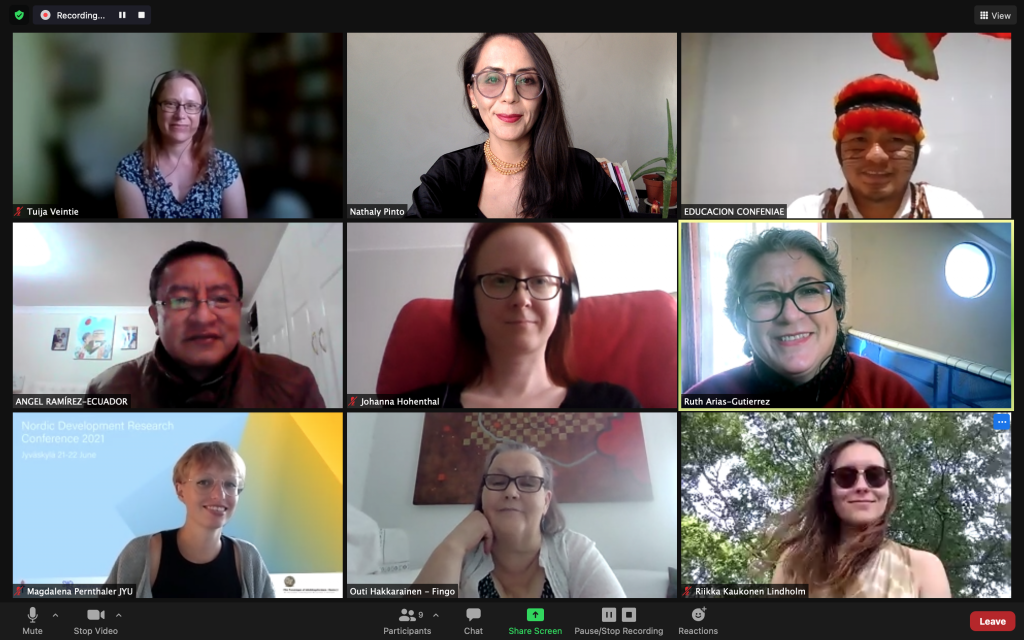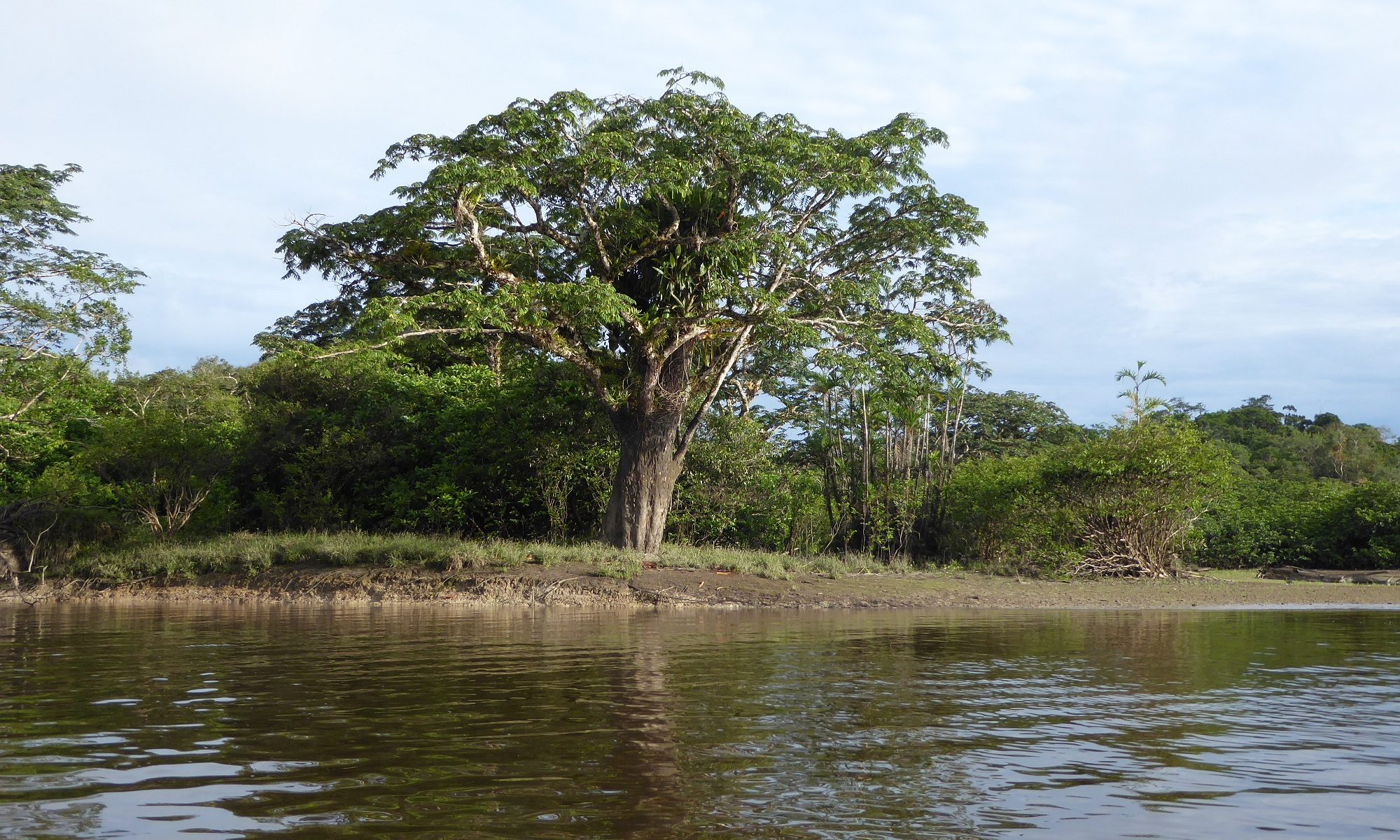Compiled texts from authors’ presentations and abstracts.

Our research group participated in the 6th joint Nordic Development Research Conference, held online from 21 to 22 of June, by the University of Jyväskylä, Finland. The conference is organized jointly by the Finnish Society for Development Research, the Danish Association of Development Researchers in Denmark, the Norwegian Association For Development Research, and the Swedish Development Research Network., usually attracting development researchers and policy-makers from Nordic countries and research collaborators from the global South. This year’s theme: Development, Learning and Education: Post-pandemic Considerations, invited participants to reflect on development, learning and education and how pressing global crises, as climate change and COVID-19, intensified pressures for radical transformations that challenge conceptualizations of “learning” as well as “unlearning” in development.
As part of our project activities, we contributed to this dialogue organizing the bilingual working group: “Decolonizing development and transforming education – Indigenous and intercultural perspectives”; “Descolonizando el desarrollo y transformando la educación – Perspectivas indígenas e interculturales”. Inviting paper presentations in English and Spanish that discussed decolonizing development and Indigenous and intercultural education in Latin America. The working group focused on research related to innovating pedagogical practices and alternative conceptualisations of development emerging from local communities in Latin America that aim to weave alternative educational futures for historically marginalized peoples, languages, and knowledge.
In the working group we analysed how social inequalities and vulnerabilities affect indigenous students in Ecuadorian Amazonia and Wixárika communities in Western Mexico. The presentations revised responses to challenges that affect wellbeing and access to opportunities in education for Indigenous children and young people, that challenge homogenizing models of education. Focusing on highlighting capacity building processes and practical knowledge systems, scientific interculturality as an alternative to the colonialism of knowledge, and experiences that bring forward Indigenous peoples’ perspectives. And, through six presentations, engaged in critical analysis from multiple, and multidisciplinary perspectives:
- Fostering Indigenous young people’s socio-environmental consciousness through place-based learning in Ecuadorian Amazonia, by Johanna Hohenthal – Global Development studies, University of Helsinki.
This presentation focused on how indigenous young people perceive their living environment and socio-environmental issues affecting it. Also, the ways in which youths’ daily world of experience and formal and informal learning environments support their place-based learning, develop their critical socio-environmental consciousness and strengthen their territorial ties. Around materials of participatory mapping, photo elicitation, observation and interviews in three IBE upper secondary schools of Pastaza Province, the authors try to discover young people’s perceptions and learning about the socio-environmental issues in their living area. Concluding that, some helpful practices for strengthening intercultural bilingual education (IBE) programmes, could rely on raising teachers’ awareness of local environmental issues, and drawing more explicit connections to local issues and knowledge would contribute to pluriversalizing education and support students’ territorial ties.
- Intercultural Education in Ecuador: Epistemic Rights and Territorial Struggles in the Ecuadorian Amazonia, by Riikka Kaukonen-Lindholm – Global Development studies, University of Helsinki.
This conversation started by contrasting how in Ecuador –particularly in Pastaza in the Amazonian region, indigenous peoples’ political struggle has led to significant achievements, while territorial autonomy and self-determination remain as ongoing political fight. In this light, though document analysis Rikka examined how education policies have an immense importance for the emancipatory struggles of indigenous organizations, which have involved Bilingual Intercultural Education (BIE) as a practice of social inclusion, ontological recognition, and revitalization of eco-cultural knowledge of indigenous people and in formal education. To later discuss a connected case study, composed of semi-structured interviews collected in Sarayaku during two visits in 2019, on the Kawsak Sacha (Living Forest) programme developed by the Sarayaku people and its application to education, to finally argue that the most fundamental manner that education contributes to cultural governmentality is the incorporation of indigenous knowledge into the education systems.
- Indigenous initiatives of intercultural education in Wixárika communities in Western Mexico. Transformative change enhanced?, by Outi Hakkarainen – CRASH, Coalition for Research and Action for Social Justice and Human Dignity.
This presentation introduced an exploratory presentation on the initiatives, activities, and experiences of intercultural education of the Wixaritari and of civil society organisations (CSOs) cooperating with these communities. The presentation discussed private and public schools cases, where the Wixaritari debated on their own educational development models around territorial and cultural recuperation. And, through data collected intermittently since 1995, projected responding to questions like: Have struggles and initiatives for intercultural education, local democracy, and territory promoted change which could be identified as transformative in their communities and in the surrounding society?, How cooperation with CSOs impact the achievement of transformative change?.
- La interculturalidad científica alternativa al colonialismo dogmático del conocimiento, by Ángel Ramirez – Organización Comunitaria Pluriversidad “Amawtay Wasi”.
In his presentation, Ángel spoke of scientific interculturality as a methodological proposal to build science and technology based on the collective knowledge of each culture. He emphasized that the participation of elder men and women, as a primary source of information, and the use of people’s own languages, are a central part of the development of collective intellectual property knowledge. In the presentation he also proposes multilogicity, as a concept and method of construction of new knowledge from the logical structures and categories of cultures. To explain it, he mentions plants and health taxonomies in indigenous territories, where those are classified as male and female, hot and cold. And he explains the relationship of these taxonomies for indigenous communities: In intercultural health a cold disease must be cured with a hot plant; A hot disease must be cured with a cold plant. Thus, Ángel exposes how multilogicity finds new categories from the knowing heart of each culture, generating new knowledge denominated collective.
- Intercultural and decolonial perspectives at Universidad Estatal Amazónica-Ecuador, by Ruth Arias-Gutierrez –Universidad Estatal Amazónica del Ecuador.
In this presentation, Ruth examines the intercultural exercise within the Universidad Estatal Amazonica (Amazon State University; UEA, in Spanish) in Puyo, Ecuador. A public university that reflects the society and the territory in which its situated: natural and cultural diversity characteristic of the Amazon region, particularly Pastaza, where seven of the fifteen original nations of the country coexist, along with mestizo and Afro-descendant populations. Through an analysis of enrollment and degree works, Ruth reflected on the typology of UEA as an intercultural university, on decolonial educational work in knowledge, and the inclusion of the management of native renewable resources of Amazonian biodiversity. Making notes on the impact of the pandemic on the decrease in opportunities for access to higher education, reflected in a lower enrollment of students self-identified as indigenous in recent periods. The presentation, conclude by ratifying that the evolution, permanence and intercultural stability of indigenous students, linked to overcoming discrimination, and improving performance in jobs and grades, is directly related to the availability of financial resources for student maintenance, internet access and devices connection to classes.
- Emergencia de educación en la amazonía: aprendiendo de acciones indígenas de resistencia, by Nathaly Pinto – Escuela de Artes, Diseño y Arquitectura de la Universidad Aalto; and Efrén Nango – Confederación de las Nacionalidades Indígenas de la Amazonía Ecuatoriana (CONFENIAE).
The speakers talked about a collaborative design project focused on the experience of young people of different Amazonian nationalities, motivated by making visible the situation that indigenous students are going through today. And introduced products of the periodic reporting of these young people raised for four months from the territory, which speak of their own student reality and that of their peers. At the same time, they discussed the strategies adopted by indigenous organizations to demand justice and attention, and their proposals for interculturality. As reflections, Nathaly and Efrén spoke about how, in the realization of these information tools, an ongoing process, indigenous youth re-actualize forms of collective action as organizational strength and community self-management. And how, by working together: youth and indigenous organizations sought to build information tools that support advocacy work from indigenous communities and organizations and help to make the educational situation visible from the voices of indigenous students, as subjects of action committed to the situation.
Coordinators: Tuija Veintie and Nathaly Pinto.
